De Britse staatsman en schrijver Sir Winston Leonard Spencer Churchill werd geboren in Woodstock op 30 november 1874. Zie ook alle tags voor Winston Churchill op dit blog.
Uit: The Crossing
“I was born under the Blue Ridge, and under that side which is blue in the evening light, in a wild land of game and forest and rushing waters. There, on the borders of a creek that runs into the Yadkin River, in acabin that was chinked with red mud, I came into the world a subject ofKing George the Third, in that part of his realm known as the province ofNorth Carolina.
The cabin reeked of corn-pone and bacon, and the odor of pelts. It had two shakedowns, on one of which I slept under a bearskin. A rough stone chimney was reared outside, and the fireplace was as long as my father was tall. There was a crane in it, and a bake kettle; and over it great buckhorns held my father’s rifle when it was not in use. On other horns hung jerked bear’s meat and venison hams, and gourds for drinking cups, and bags of seed, and my father’s best hunting shirt; also, in a neglected corner, several articles of woman’s attire from pegs. These once belonged to my mother. Among them was a gown of silk, of a fine, faded pattern, over which I was wont to speculate. The women at the Cross-Roads, twelve miles away, were dressed in coarse butternut wool and huge sunbonnets. But when I questioned my father on these matters he would give me no answers.
My father was–how shall I say what he was? To this day I can only surmise many things of him. He was a Scotchman born, and I know now that he had a slight Scotch accent. At the time of which I write, my early childhood, he was a frontiersman and hunter. I can see him now, with his hunting shirt and leggings and moccasins; his powder horn, engraved with wondrous scenes; his bullet pouch and tomahawk and hunting knife. He was a tall, lean man with a strange, sad face. And he talked little save when he drank too many “horns,” as they were called in that country.”
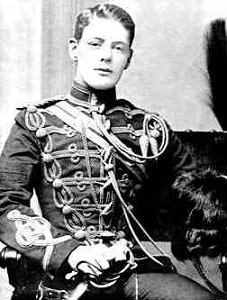
Winston Churchill (30 november 1874 – 24 januari 1965)
De Canadese schrijfster Lucy Maud Montgomery werd geboren in Clifton op 30 november 1874. Zie ook alle tags voor Lucy Maud Montgomery op dit blog.
Uit: Anne Of Green Gables
“She was sitting there one afternoon in early June. The sun was coming in at the window warm and bright; the orchard on the slope below the house was in a bridal flush of pinky-white bloom, hummed over by a myriad of bees. Thomas Lynde– a meek little man whom Avonlea people called “Rachel Lynde’s husband”–was sowing his late turnip seed on the hill field beyond the barn; and Matthew Cuthbert ought to have been sowing his on the big red brook field away over by Green Gables. Mrs. Rachel knew that he ought because she had heard him tell Peter Morrison the evening before in William J. Blair’s store over at Carmody that he meant to sow his turnip seed the next afternoon. Peter had asked him, of course, for Matthew Cuthbert had never been known to volunteer information about anything in his whole life.
And yet here was Matthew Cuthbert, at half-past three on the afternoon of a busy day, placidly driving over the hollow and up the hill; moreover, he wore a white collar and his best suit of clothes, which was plain proof that he was going out of Avonlea; and he had the buggy and the sorrel mare, which betokened that he was going a considerable distance. Now, where was Matthew Cuthbert going and why was he going there?”
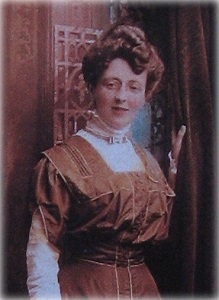
Lucy Maud Montgomery (30 november 1874 – 24 april 1942)
De Duitse dichter en schrijver Rudolf Lavant (eig. Richard Cramer) werd geboren op 30 november 1844 in Leipzig. Zie ook alle tags voor Rudolf Lavant op dit blog.
Heißer Wunsch
Ein schönes Alter wurde mir beschieden,
Auf das zu hoffen niemals ich gewagt;
Doch sehnt man sich nach Ruhe und nach Frieden,
Da man der Hoffnung ohnehin entsagt.
Nun würgt es mich, den Müden, an der Kehle,
Da ich so fest an meinen Traum geglaubt —
Es wurde mir das Gleichgewicht der Seele,
Der Nächte Schlummer wurde mir geraubt.
Ich sah vor mir zerfahren und zerrinnen,
Was seit den Kinderjahren ich geliebt;
Ich muss mich immer mühsam erst besinnen,
Dass so etwas wie Freude es noch gibt.
Und dennoch möchte ich nicht vom Leben scheiden,
Bis uns ein Retter aus der Not erstand,
Bis nach des Weltkampfs grauenhaften Leiden
Erschüttert man den Mut zum Frieden fand.
Bis über sich nach schreckerfüllten Tagen
Den schönsten Sieg Europas Rat gewann,
Bis das Geschlecht als einz’ge Frucht der Klagen
Sich auf die Menschlichkeit zurückbesann.
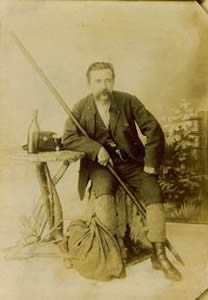
Rudolf Lavant (30 november 1844 – 6 december 1915)
De Engelse dichter en schrijver John Bunyan werd geboren op 30 november 1628 in Harrowden bij Bedford. Zie ook alle tags voor John Bunyan op dit blog.
The Shepherd Boy sings in the Valley of Humiliation
HE that is down needs fear no fall,
He that is low, no pride;
He that is humble ever shall
Have God to be his guide.
I am content with what I have,
Little be it or much:
And, Lord, contentment still I crave,
Because Thou savest such.
Fullness to such a burden is
That go on pilgrimage:
Here little, and hereafter bliss,
Is best from age to age.
Upon The Lord’s Prayer
Our Father which in heaven art,
Thy name be always hallowed;
Thy kingdom come, thy will be done;
Thy heavenly path be followed
By us on earth as ’tis with thee,
We humbly pray;
And let our bread us given be,
From day to day.
Forgive our debts as we forgive
Those that to us indebted are:
Into temptation lead us not,
But save us from the wicked snare.
The kingdom’s thine, the power too,
We thee adore;
The glory also shall be thine
For evermore.
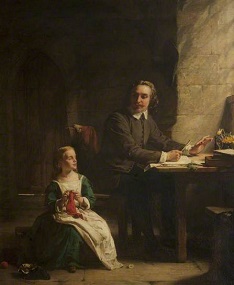
John Bunyan (30 november 1628 – 31 augustus 1688)
John Bunyan in de gevangenis van door Alexander Johnston, eind 19e eeuw
De Chileense dichter en schrijver Sergio Badilla Castillo werd geboren in Valparaíso op 30 november 1947. Zie ook alle tags voor Sergio Badilla Castillo op dit blog.
THE MAN FROM CARTHAGE
The crowd with spontaneous anxiety fossilizes itself in this anchorage
I came here to hide myself like an old elephant
looking for a place to die
the city I’ve always loved as if it was my woman.
Although she distanced herself for more than 30 years .
The overseer makes fun of the globetrotter’s return
despicable gawky still with his European mind
with phlegmatic manners of a English gentleman
overwhelmed by secret enemies:
It is old Strindberg walking in Karlavägen under the snow
or perhaps myself at noon in the coastal promenade,
wandering around aimlessly to recover the lost tracks
on the pavement.
Mathematical confusions explain my ominous years.
I remain perplex when an imprudent lady consults about my
mother’s health and then I think I’m still transcendent
behind all the skylights and inner doors.
The exile /at heart/ was more a lack of affection than expatriation
and perhaps not what I expect from this return.
The light of a lamppost partly obstructs / my eyes’ obstinate
glance with sincere restlessness. The sea is there and escapes in the horizon of the prospect of my gaze
August Strindberg /decayed and bearded/ has returned to Stockholm
He reads a volume /at the blue tower of Drottninggatan/ about a solitary man in front of the sea in Carthage.
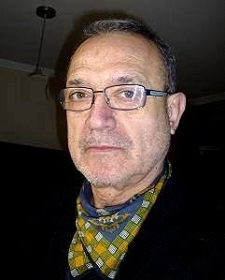
Sergio Badilla Castillo (Valparaíso, 30 november 1947)
De Amerikaanse toneelschrijver en filmregisseur David Mamet werd geboren op 30 november 1947 in Chicago. Zie ook alle tags voor David Mamet op dit blog.
Uit: Why I Am No Longer a ‘Brain-Dead Liberal’
“These cherished precepts had, over the years, become ingrained as increasingly impracticable prejudices. Why do I say impracticable? Because although I still held these beliefs, I no longer applied them in my life. How do I know? My wife informed me. We were riding along and listening to NPR. I felt my facial muscles tightening, and the words beginning to form in my mind: Shut the fuck up. “?” she prompted. And her terse, elegant summation, as always, awakened me to a deeper truth: I had been listening to NPR and reading various organs of national opinion for years, wonder and rage contending for pride of place. Further: I found I had been—rather charmingly, I thought—referring to myself for years as “a brain-dead liberal,” and to NPR as “National Palestinian Radio.”
This is, to me, the synthesis of this worldview with which I now found myself disenchanted: that everything is always wrong.
But in my life, a brief review revealed, everything was not always wrong, and neither was nor is always wrong in the community in which I live, or in my country. Further, it was not always wrong in previous communities in which I lived, and among the various and mobile classes of which I was at various times a part.
And, I wondered, how could I have spent decades thinking that I thought everything was always wrong at the same time that I thought I thought that people were basically good at heart?”
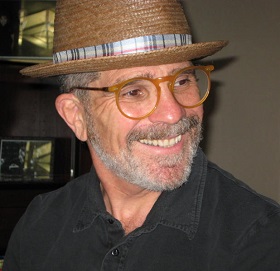
David Mamet (Chicago, 30 november 1947)
De Amerikaanse schrijver Wil Mara werd geboren op 30 november 1966 in de buurt van Long Beach Island, New Jersey. Zie ook alle tags voor Wil Mara op dit blog.
Uit: Blown Away!
“She went up to Jewel and petted her nose. Jewel seemed to like it. “Excuse me. I couldn’t help overhearing. I love mules, as you can probably tell. And this one is pretty, and sweet, too.” The girl’s long red hair, which was held back with a white headband, reminded me of Rudy’s tail. I felt a bit ashamed when the thought crossed my mind; comparing a girl’s hair to a dog’s tail wasn’t very nice. But Rudy’s tail was beautiful — long and silky — and the girl’s hair, which fell to her waist, was long and silky too.
“I was to meet my aunt Edith here, but she’s late. Can you tell me how to find Edith Kraynanski’s house?” she asked.
Dad and I looked at each other in surprise. Edith Kraynanski was a Polish lady who had lived alone in her tidy little house for as long as I could remember. She was known for the delicious Polish food that she often shared with her neighbors. We never knew she had any family. “I’ll show you where she lives,” I offered. “But first I should help Sharkey with the mule and the dog.”
“I’ll give Sharkey a hand,” Dad offered. “After you take…” He paused.
“Mara,” the girl said, holding out her hand. “Mara Lynn Kraynanski.”
“How do you do, Mara,” Dad said, shaking her hand. “I’m Doug Pitney, and this is my son, Jake. We live at the general store down the road apiece, and your aunt Edith lives near us.” He turned to me. “Jake, take Mara’s suitcase and show her to Miss Edith’s place. I’ll help with the mule until you can get back to Sharkey’s.”
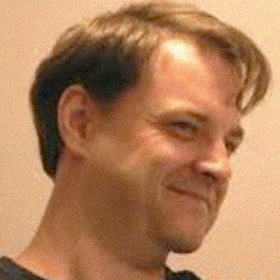
Wil Mara (Long Beach Island, 30 november 1966)
